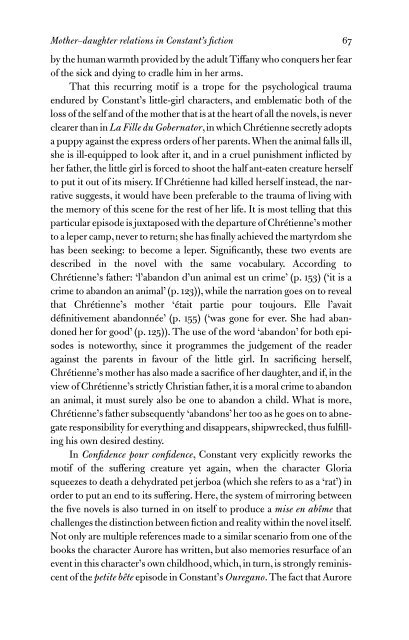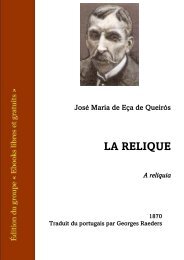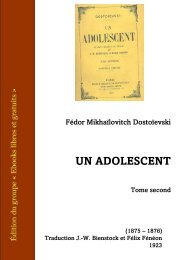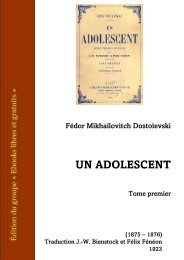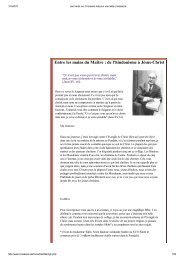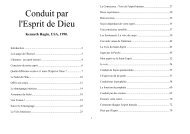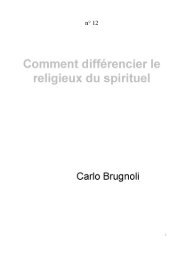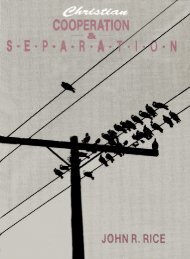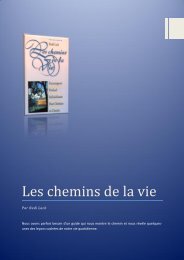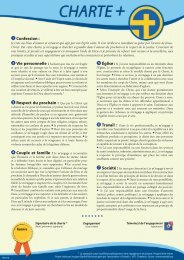Women writing in contemporary France
Create successful ePaper yourself
Turn your PDF publications into a flip-book with our unique Google optimized e-Paper software.
Mother–daughter relations <strong>in</strong> Constant’s fiction 67<br />
by the human warmth provided by the adult Tiffany who conquers her fear<br />
of the sick and dy<strong>in</strong>g to cradle him <strong>in</strong> her arms.<br />
That this recurr<strong>in</strong>g motif is a trope for the psychological trauma<br />
endured by Constant’s little-girl characters, and emblematic both of the<br />
loss of the self and of the mother that is at the heart of all the novels, is never<br />
clearer than <strong>in</strong> La Fille du Gobernator, <strong>in</strong> which Chrétienne secretly adopts<br />
a puppy aga<strong>in</strong>st the express orders of her parents. When the animal falls ill,<br />
she is ill-equipped to look after it, and <strong>in</strong> a cruel punishment <strong>in</strong>flicted by<br />
her father, the little girl is forced to shoot the half ant-eaten creature herself<br />
to put it out of its misery. If Chrétienne had killed herself <strong>in</strong>stead, the narrative<br />
suggests, it would have been preferable to the trauma of liv<strong>in</strong>g with<br />
the memory of this scene for the rest of her life. It is most tell<strong>in</strong>g that this<br />
particular episode is juxtaposed with the departure of Chrétienne’s mother<br />
to a leper camp, never to return; she has f<strong>in</strong>ally achieved the martyrdom she<br />
has been seek<strong>in</strong>g: to become a leper. Significantly, these two events are<br />
described <strong>in</strong> the novel with the same vocabulary. Accord<strong>in</strong>g to<br />
Chrétienne’s father: ‘l’abandon d’un animal est un crime’ (p. 153) (‘it is a<br />
crime to abandon an animal’ (p. 123)), while the narration goes on to reveal<br />
that Chrétienne’s mother ‘était partie pour toujours. Elle l’avait<br />
déf<strong>in</strong>itivement abandonnée’ (p. 155) (‘was gone for ever. She had abandoned<br />
her for good’ (p. 125)). The use of the word ‘abandon’ for both episodes<br />
is noteworthy, s<strong>in</strong>ce it programmes the judgement of the reader<br />
aga<strong>in</strong>st the parents <strong>in</strong> favour of the little girl. In sacrific<strong>in</strong>g herself,<br />
Chrétienne’s mother has also made a sacrifice of her daughter, and if, <strong>in</strong> the<br />
view of Chrétienne’s strictly Christian father, it is a moral crime to abandon<br />
an animal, it must surely also be one to abandon a child. What is more,<br />
Chrétienne’s father subsequently ‘abandons’ her too as he goes on to abnegate<br />
responsibility for everyth<strong>in</strong>g and disappears, shipwrecked, thus fulfill<strong>in</strong>g<br />
his own desired dest<strong>in</strong>y.<br />
In Confidence pour confidence, Constant very explicitly reworks the<br />
motif of the suffer<strong>in</strong>g creature yet aga<strong>in</strong>, when the character Gloria<br />
squeezes to death a dehydrated pet jerboa (which she refers to as a ‘rat’) <strong>in</strong><br />
order to put an end to its suffer<strong>in</strong>g. Here, the system of mirror<strong>in</strong>g between<br />
the five novels is also turned <strong>in</strong> on itself to produce a mise en abîme that<br />
challenges the dist<strong>in</strong>ction between fiction and reality with<strong>in</strong> the novel itself.<br />
Not only are multiple references made to a similar scenario from one of the<br />
books the character Aurore has written, but also memories resurface of an<br />
event <strong>in</strong> this character’s own childhood, which, <strong>in</strong> turn, is strongly rem<strong>in</strong>iscent<br />
of the petite bête episode <strong>in</strong> Constant’s Ouregano. The fact that Aurore


